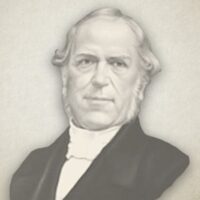
23 Did Paul Take Opportunities To Preach Duty Faith?
And after certain days, when Felix came with his wife Drusilla, which was a Jewess, he sent for Paul and heard him concerning the faith in Christ,’ Acts 24:24. This was a most favorable opportunity for duty faith and universal invitations to have been advanced and enforced; and such an opportunity too, as could not have justly or innocently been suffered to pass by un- embraced and unimproved, had any such doctrines, sentiments, principles, thoughts or ideas been contained and known in the apostle’s great commission `to bear the Lord’s name before the Gentiles, and kings, and the children of Israel,’ Acts 9:15. But is there anything of the kind to be found here in Paul’s address? No, not one word, for at verse 25, chap 24 it is said, `And as he reasoned of righteousness, temperance, and judgment to come, Felix trembled.’ Here was no duty faith nor universal invitations in this, but a fair and honest statement of facts, supported by sound and solemn reasoning. This was a mode of address to a Gentile sinner that needed no reconciling with the counsels of God and other truths of the faith of Christ.
And Paul said, I would to God, that not only thou, but also all that hear me this day, were both almost and altogether such as I am, except these bonds,’ Acts 26:29. Here was a good opportunity, and one in which we might reasonably expect to find something of duty faith and universal invitations principles, in some one form of countenance or another, if any such thing had been in either Paul’s creed or commission. For ‘Agrippa said unto Paul, almost thou persuadest me to be a Christian,’ verse 28. And why did not Paul snatch up this opportunity that was so widely opened before him, and at once tell Agrippa and all that heard him that day, that it was their duty to believe unto salvation, and to be altogether as he was in the faith of Christ: and accordingly exhort and invite, and enforce upon them to be so without delay? He did not do so, and his not doing so could not be from fear, for he spoke freely before the king, verse 26; nor could it be from a want of zeal for the cause of God, for he counted not his life dear compared to that, Acts 20:22-24; nor for want of love to souls, because he wished all that heard him that day to be altogether as he was in the faith and hope of the gospel, if the Lord’s will. But he did not appeal to Agrippa and the rest, or any of them, on duty faith principles, saying that it was their duty, and that they ought to be so; but made his appeal to God, if it were his will, to make them so; as that it was in God’s power only to make them so, and that the divine will, and not man’s, must determine whether it should be or not; and that with all his best wishes, Paul had no authority to speak otherwise of the matter. Here the apostle said not a word that was not in harmony with the counsels of God, and all the truths of the free grace gospel and sovereign salvation of God. And why did he not? but first, because he had no such thing in his commission from the Lord; second, because he knew of no such thing in his own faith; and, third, because he knew of no such thing as duty faith and universal invitations in his own personal coming into the faith of Christ and hope of eternal life: nor as any way relating to his own free grace salvation, which he so fully maintained to be by the power of God, according to eternal purpose.
In the two epistles to Timothy, and in the one to Titus, in which Paul the apostle gives them respectively his most solemn, faithful and affectionate charge, in the name of the Lord, on the truths, and on the order and manner of life they should be careful to maintain in their ministry and example to the end of their days, not a verse, line or word, can be found which can, even in sound, be decently made to imply the least shadow of a charge, hint or intimation to enforce, preach or name faith unto salvation as the natural man’s duty; nor anything of universal invitations, or invitations of the dead in sin to believe and come into the love, peace and blessings of God’s salvation.
John Foreman (1792-1872) was a Strict and Particular Baptist preacher. He was appointed the Pastor of Hill Street Chapel, Marylebone, serving this position for close to forty years.
JOHN FOREMAN'S LIFE AND MINISTRY
JOHN FOREMAN ON DUTY FAITH (COMPLETE)
JOHN FOREMAN'S BAPTISM AND COMMUNION CONSIDERED (COMPLETE)




